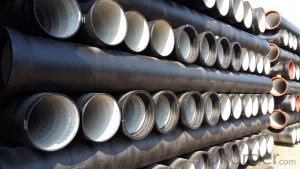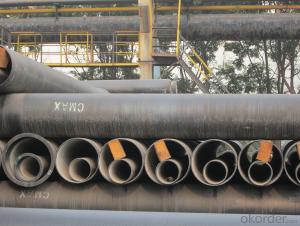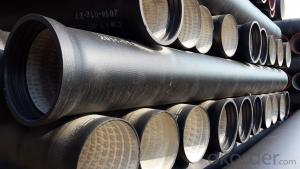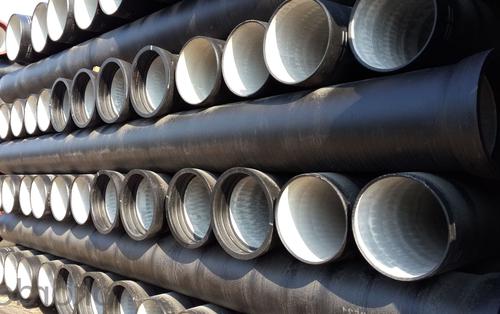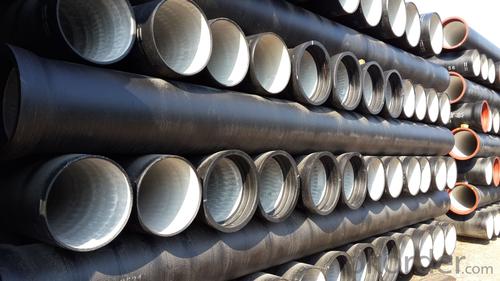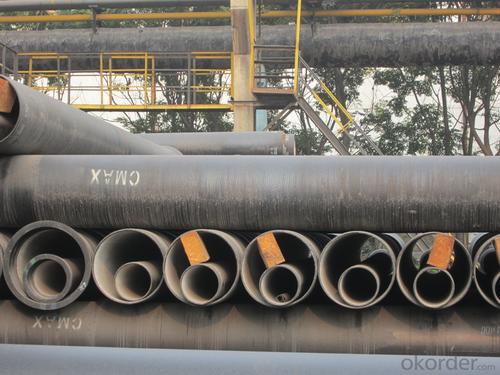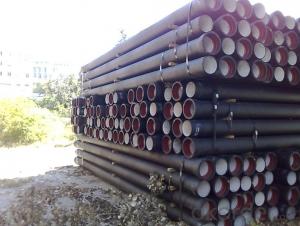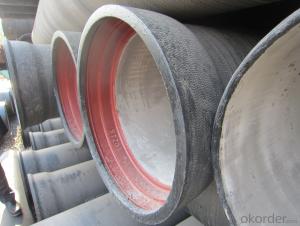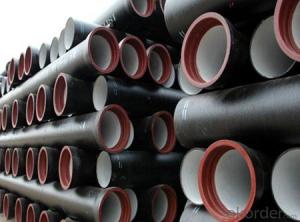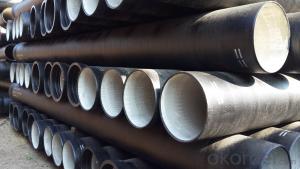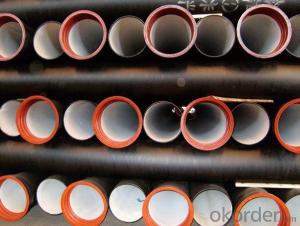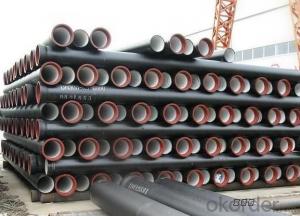Ductile Iron Pipe of China DN200-DN400 EN545/ EN598/ ISO2531
- Loading Port:
- China main port
- Payment Terms:
- TT or LC
- Min Order Qty:
- 20 m.t.
- Supply Capability:
- 50000 m.t./month
OKorder Service Pledge
OKorder Financial Service
You Might Also Like
1. Ductile Iron Pipe Description :
1) Pipes confirm to ISO2531,K9 class,T type joint,6m long,with inside cements lining conform to ISO4179, outside Zinc spraying(130g/m2) and bitumen coating(70μm) conform to ISO8179.
2) Pipe ends: Spigot and socket ends, with 100% SBR rubber gaskets accoding to ISO4633
3) We can do third party inspection according to customer's request.
4) Our products have been sold to many international market,such as Middle East and South East Asia and Africa.
2. Main Features of the Ductile Iron Pipe:
·High yield strength
·High tensile Strength
·High corrosion resistance
·Pressure Resistence
·Anti-corrosion
·Installation is convenient
·Satisfy the highest hygienic standards
3. Ductile Iron Pipe Images:
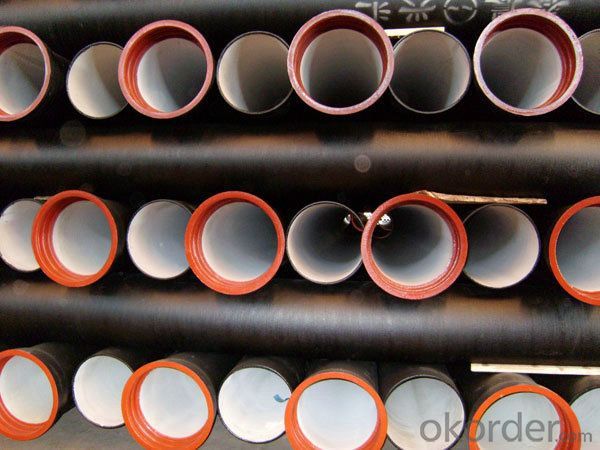
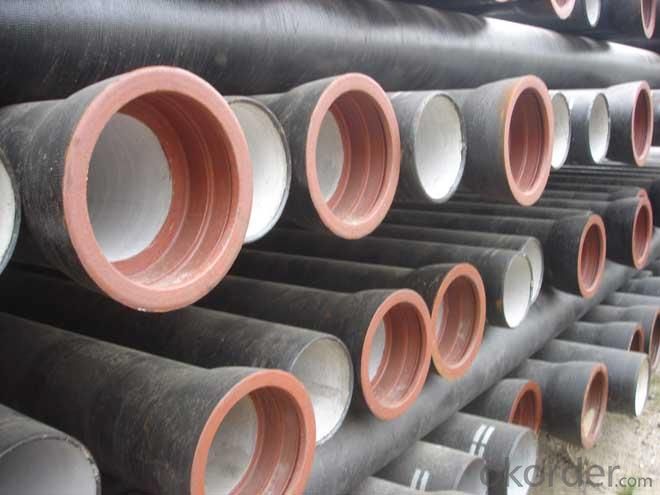
4. Ductile Iron Pipe Specification
Standard: API SPEC 5L 44th eidtion,ASTM A252-98(2007)
Grade: A53 Grades A/B, ASTM A106 Grades B/C,ASTM A179
AWWA, C200, ASTM A139, ASTM A120, API 5L Grade B
X42, X52, X56, X60, X65, X70, X80, X100
Weld Alternatives: LSAW
OD size range: 6.4~44.5mm
Wall thickness: 406.4~1422mm
Length: 3 - 12 m according to requirment
Note: Other grade can also be provided after consulting. Special design are available
for coal slurry conveyance LSAW line tube -- Service.
5. FAQ:
We have organized several common questions for our clients,may help you sincerely:
1).Q: Why would you choose ductile iron pipe rather than other pipe materials?
A:The reasons are obvious for that not only ductile iron pipe possesses the inherent strength and flexibility of ductile iron, combined with proven corrosion protection systems, but also the cost savings can be achieved from design to installation and commissioning.
2).Q:Why can you guarantee the inner of pipes can’t be corroded?
A: High alumina cement mortar lining and sulphate-resistant cement mortar lining. These two special linings are applicable to inner anti-corrosion for sewage pipes, improving resistance to erosion of the sewage components.
- Q: Can ductile iron pipes be used for underground hydrocarbon pipelines?
- Indeed, underground hydrocarbon pipelines can utilize ductile iron pipes. Ductile iron, a robust and long-lasting substance, finds extensive usage in multiple domains, such as water and sewage systems, gas pipelines, and even hydrocarbon pipelines. Ductile iron pipes boast outstanding corrosion resistance qualities and can endure substantial pressure, rendering them apt for subterranean hydrocarbon transportation. Nonetheless, prudent material selection and the implementation of corrosion protection measures become essential, considering factors like the precise composition of the hydrocarbons being conveyed and the environmental conditions along the pipeline route.
- Q: Are ductile iron pipes resistant to abrasion?
- Yes, ductile iron pipes are highly resistant to abrasion.
- Q: What are the different methods for testing ductile iron pipe?
- There are several methods for testing ductile iron pipe, including visual inspection, hydrostatic pressure testing, ultrasonic testing, magnetic particle inspection, and mechanical testing.
- Q: Can ductile iron pipe be used for industrial process piping?
- Yes, ductile iron pipe can be used for industrial process piping. Ductile iron pipe is known for its strength, durability, and resistance to corrosion, making it a suitable choice for various industrial applications. It can handle high-pressure systems and is often used in industries such as water and wastewater treatment, oil and gas, chemical processing, and power generation. Additionally, ductile iron pipe is easy to install and has a long lifespan, making it a cost-effective option for industrial process piping.
- Q: What is the expected external coating for ductile iron pipes?
- The expected external coating for ductile iron pipes is typically a protective layer that is applied to the exterior surface of the pipe to prevent corrosion and extend its lifespan. Some common types of external coatings for ductile iron pipes include polyethylene, polyurethane, and epoxy coatings. These coatings provide a barrier between the pipe and the surrounding environment, preventing the pipe from coming into contact with corrosive substances such as soil, water, and chemicals. The choice of coating depends on factors such as the intended application, soil conditions, and the level of corrosion protection required. Overall, the expected external coating for ductile iron pipes is designed to ensure the longevity and durability of the pipes in various environmental conditions.
- Q: How do ductile iron pipes handle ground movement in earthquake-prone areas?
- Ductile iron pipes are known for their excellent resistance to ground movement, making them a reliable choice for earthquake-prone areas. These pipes are designed to withstand external forces, including the ground shifting and movement caused by seismic activities. The flexibility of ductile iron pipes allows them to absorb and distribute the energy generated during ground movement. This flexibility is achieved due to the unique composition of ductile iron, which includes nodular graphite in its microstructure. The nodular graphite provides ductility and resilience to the pipe, allowing it to deform under stress without fracturing. When an earthquake occurs and the ground starts to move, ductile iron pipes can adapt to the changing conditions. They have the ability to elongate, compress, and bend, thus reducing the risk of pipe failure. This characteristic is crucial in earthquake-prone areas, as it helps prevent catastrophic failures and water loss that can occur with more rigid pipe materials. Moreover, ductile iron pipes have a high level of joint integrity, which further enhances their ability to handle ground movement during seismic events. The joints of these pipes are designed to withstand lateral and angular movement, ensuring that they remain intact and leak-free. In addition to their inherent flexibility, ductile iron pipes are often installed using techniques that enhance their resistance to ground movement. Anchoring systems, such as thrust blocks and restraints, can be utilized to secure the pipes and prevent excessive movement. These systems help to stabilize the pipeline network and further minimize the potential for damage during earthquakes. Overall, the combination of ductility, joint integrity, and anchoring systems make ductile iron pipes a reliable choice for handling ground movement in earthquake-prone areas. They provide a durable and resilient solution that can withstand the challenges posed by seismic activities, ensuring the continuous supply of water and minimizing the risk of infrastructure damage.
- Q: Ductile iron pipe is how many years warranty
- Ductile iron pipe warranty is unlimited.
- Q: Are there any special considerations for installing ductile iron pipe in rocky soils?
- Yes, there are special considerations for installing ductile iron pipe in rocky soils. The presence of rocks can pose challenges during the installation process as they can cause damage to the pipe or impede its proper alignment. Therefore, it is important to carefully assess the soil conditions and rock content at the installation site. Additional measures such as proper bedding and backfilling techniques, using protective coatings or linings, and employing specialized equipment may be necessary to ensure the durability and longevity of the ductile iron pipe in rocky soils.
- Q: Can ductile iron pipe be used for road and highway crossings?
- Ductile iron pipe is indeed suitable for road and highway crossings. This material, known for its strength and durability, is ideal for underground infrastructure projects like road and highway crossings. Its remarkable ability to withstand heavy loads, corrosion, and external forces makes it the perfect choice for enduring the traffic and environmental conditions commonly encountered in road and highway crossings. Moreover, ductile iron pipe comes in different sizes and strengths, offering customization options to meet the specific needs of the crossing. To maximize the longevity and performance of ductile iron pipes in road and highway crossings, it is crucial to follow proper installation techniques and adhere to relevant industry standards.
- Q: How do ductile iron pipes perform in earthquake-induced ground movements?
- Ductile iron pipes have been proven to be a dependable and resilient choice for underground infrastructure, even in earthquake-prone regions. The distinctive qualities of ductile iron, such as its strength and flexibility, enable it to withstand the impacts of ground movements during an earthquake. When an earthquake occurs, the ground shakes and shifts, exerting significant forces on underground pipes. Ductile iron pipes possess the ability to flex under these forces, absorbing the energy and minimizing the risk of failure. They can endure substantial ground movements without cracking or breaking, guaranteeing the uninterrupted flow of water or other fluids. Moreover, ductile iron pipes exhibit exceptional resistance to corrosion and are highly durable, making them suitable for long-term use in areas susceptible to earthquakes. This reduces the necessity for frequent maintenance or replacement, providing cost-effective and reliable solutions for infrastructure. Additionally, the joints employed in ductile iron pipe installations are designed to accommodate movement and permit slight adjustments during ground shifts. This adaptability prevents the pipes from becoming dislodged or separated, preserving the system's integrity. Overall, ductile iron pipes have a well-established reputation for their performance in earthquake-induced ground movements. They offer resilience, flexibility, and durability, ensuring the uninterrupted operation of water and sewer systems, even in areas prone to seismic activity.
Send your message to us
Ductile Iron Pipe of China DN200-DN400 EN545/ EN598/ ISO2531
- Loading Port:
- China main port
- Payment Terms:
- TT or LC
- Min Order Qty:
- 20 m.t.
- Supply Capability:
- 50000 m.t./month
OKorder Service Pledge
OKorder Financial Service
Similar products
Hot products
Hot Searches
Related keywords

